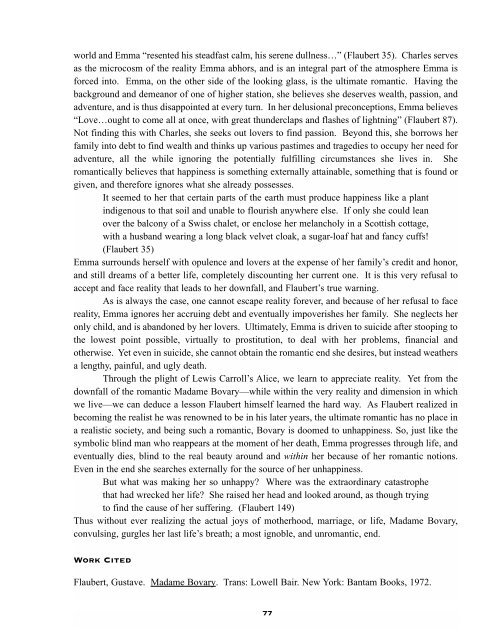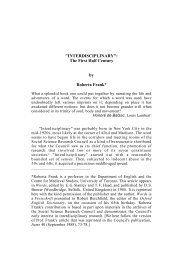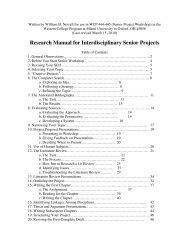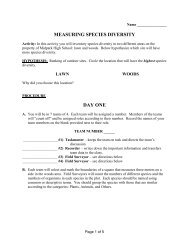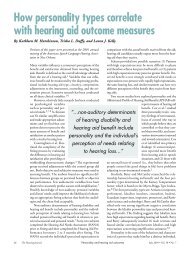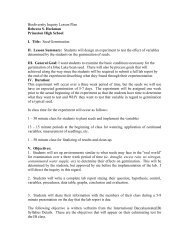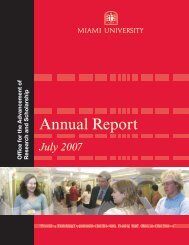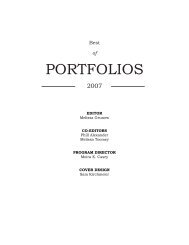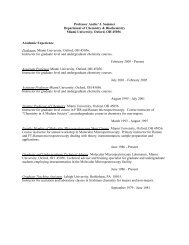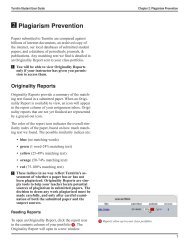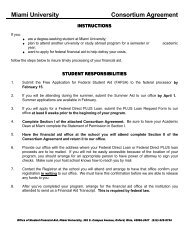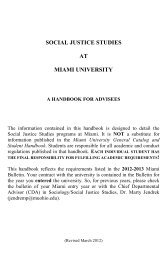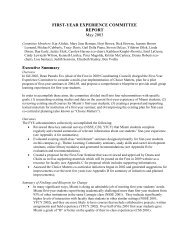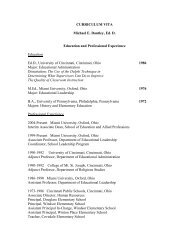Best of Miami Portfolios 2001 - Units.muohio.edu
Best of Miami Portfolios 2001 - Units.muohio.edu
Best of Miami Portfolios 2001 - Units.muohio.edu
You also want an ePaper? Increase the reach of your titles
YUMPU automatically turns print PDFs into web optimized ePapers that Google loves.
world and Emma “resented his steadfast calm, his serene dullness…” (Flaubert 35). Charles serves<br />
as the microcosm <strong>of</strong> the reality Emma abhors, and is an integral part <strong>of</strong> the atmosphere Emma is<br />
forced into. Emma, on the other side <strong>of</strong> the looking glass, is the ultimate romantic. Having the<br />
background and demeanor <strong>of</strong> one <strong>of</strong> higher station, she believes she deserves wealth, passion, and<br />
adventure, and is thus disappointed at every turn. In her delusional preconceptions, Emma believes<br />
“Love…ought to come all at once, with great thunderclaps and flashes <strong>of</strong> lightning” (Flaubert 87).<br />
Not finding this with Charles, she seeks out lovers to find passion. Beyond this, she borrows her<br />
family into debt to find wealth and thinks up various pastimes and tragedies to occupy her need for<br />
adventure, all the while ignoring the potentially fulfilling circumstances she lives in. She<br />
romantically believes that happiness is something externally attainable, something that is found or<br />
given, and therefore ignores what she already possesses.<br />
It seemed to her that certain parts <strong>of</strong> the earth must produce happiness like a plant<br />
indigenous to that soil and unable to flourish anywhere else. If only she could lean<br />
over the balcony <strong>of</strong> a Swiss chalet, or enclose her melancholy in a Scottish cottage,<br />
with a husband wearing a long black velvet cloak, a sugar-loaf hat and fancy cuffs!<br />
(Flaubert 35)<br />
Emma surrounds herself with opulence and lovers at the expense <strong>of</strong> her family’s credit and honor,<br />
and still dreams <strong>of</strong> a better life, completely discounting her current one. It is this very refusal to<br />
accept and face reality that leads to her downfall, and Flaubert’s true warning.<br />
As is always the case, one cannot escape reality forever, and because <strong>of</strong> her refusal to face<br />
reality, Emma ignores her accruing debt and eventually impoverishes her family. She neglects her<br />
only child, and is abandoned by her lovers. Ultimately, Emma is driven to suicide after stooping to<br />
the lowest point possible, virtually to prostitution, to deal with her problems, financial and<br />
otherwise. Yet even in suicide, she cannot obtain the romantic end she desires, but instead weathers<br />
a lengthy, painful, and ugly death.<br />
Through the plight <strong>of</strong> Lewis Carroll’s Alice, we learn to appreciate reality. Yet from the<br />
downfall <strong>of</strong> the romantic Madame Bovary—while within the very reality and dimension in which<br />
we live—we can d<strong>edu</strong>ce a lesson Flaubert himself learned the hard way. As Flaubert realized in<br />
becoming the realist he was renowned to be in his later years, the ultimate romantic has no place in<br />
a realistic society, and being such a romantic, Bovary is doomed to unhappiness. So, just like the<br />
symbolic blind man who reappears at the moment <strong>of</strong> her death, Emma progresses through life, and<br />
eventually dies, blind to the real beauty around and within her because <strong>of</strong> her romantic notions.<br />
Even in the end she searches externally for the source <strong>of</strong> her unhappiness.<br />
But what was making her so unhappy? Where was the extraordinary catastrophe<br />
that had wrecked her life? She raised her head and looked around, as though trying<br />
to find the cause <strong>of</strong> her suffering. (Flaubert 149)<br />
Thus without ever realizing the actual joys <strong>of</strong> motherhood, marriage, or life, Madame Bovary,<br />
convulsing, gurgles her last life’s breath; a most ignoble, and unromantic, end.<br />
Work Cited<br />
Flaubert, Gustave. Madame Bovary. Trans: Lowell Bair. New York: Bantam Books, 1972.<br />
77


